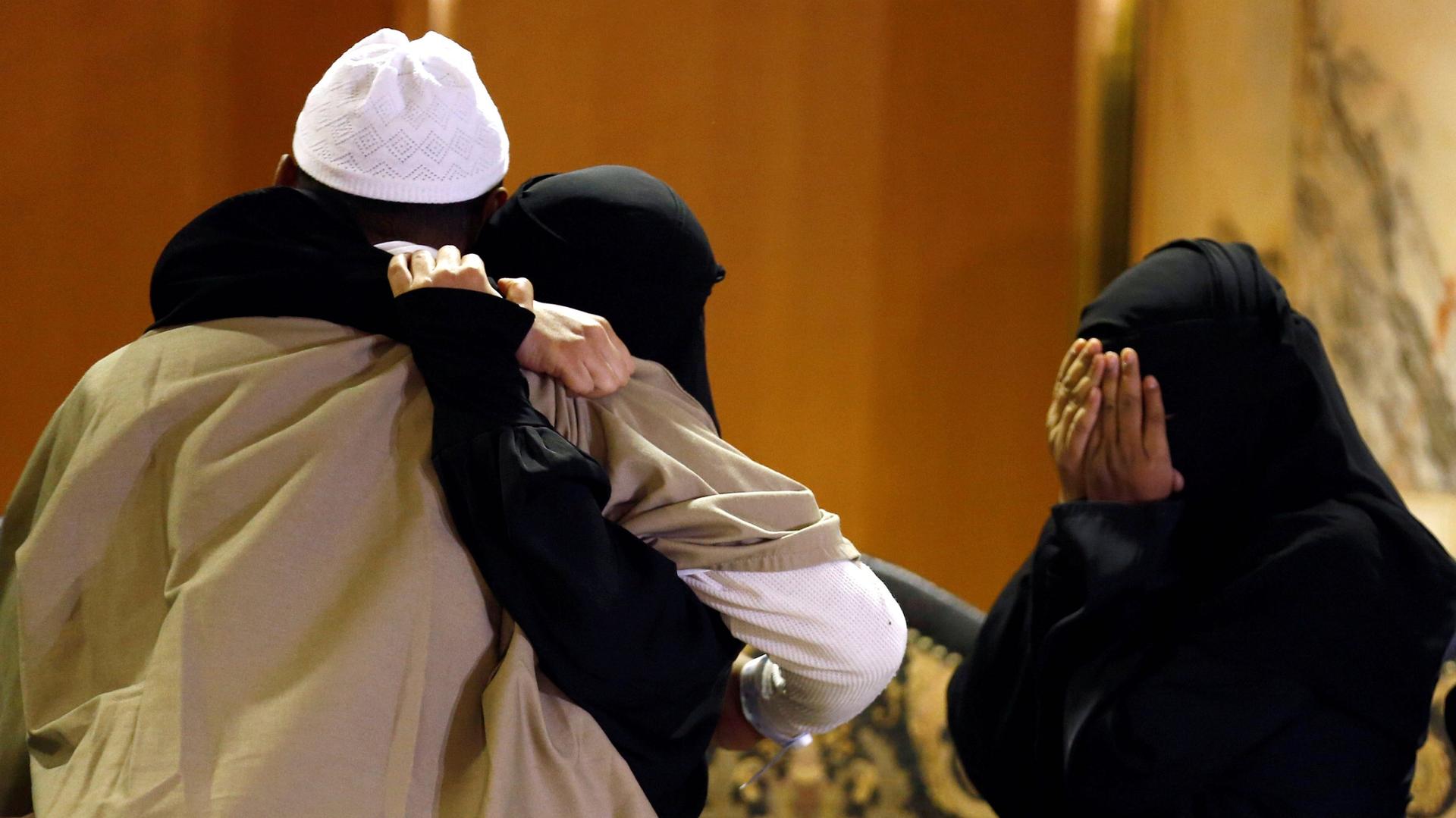After being apart for years, four prisoners released from Guantanamo are reunited with loved ones in Saudi Arabia
A freed Yemeni detainee is hugged by a family member after his arrival at King Khalid International Airport in Riyadh, Saudi Arabia, on Jan. 5, 2017.
Four Yemenis released from the US prison at Guantanamo Bay arrived Thursday in Saudi Arabia to a tearful reunion with relatives, after the White House rejected Donald Trump's call for a freeze on transfers.
The Pentagon confirmed the detainee transfers and said there are now 55 inmates still being held at the military detention center in Cuba.
In the Saudi capital, an AFP reporter saw the four prisoners after they landed at a terminal normally reserved for royals at the Riyadh international airport.
Prisoners and family members wept as they saw each other for the first time in years.
One of the released inmates, Salim Ahmed bin Kanad, told reporters he felt "born again" after seeing his relatives.
Another, Mohammed Bawazir, said he hoped to move on and forget the past.
"I want to give back to my family the 15 years I lost," he said.
Officials identified the other former prisoners as Mohammed Rajab Abu Ghanim and Abdullah Yahya al-Shalabi.
"The United States is grateful to the government of the Kingdom of Saudi Arabia for its humanitarian gesture and willingness to support ongoing US efforts to close the Guantanamo Bay detention facility," the Pentagon said.
Outgoing US President Barack Obama's pledge to close the Guantanamo Bay facility has been met with legal and political hurdles for years, and on Tuesday, his successor jumped into the fray.
"There should be no further releases from Gitmo. These are extremely dangerous people and should not be allowed back onto the battlefield," Trump tweeted.
Hours later, Obama's spokesman Josh Earnest said he would expect "additional transfers" before the Democrat hands power to Trump on Jan. 20.
Saudi King Salman has said the four Yemenis who arrived Thursday will live in the kingdom, where they will take part in a rehabilitation and deradicalization program, the interior ministry said in a statement.
The bearded ex-prisoners appeared healthy and were all dressed in two-piece Pakistani-style tunics.
One prisoner was welcomed by 21 relatives, including children, but only a handful greeted the others.
A lone woman waited for one of the inmates.
Reporters were kept in the terminal and could not see what type of aircraft had transported them.
Whittling down numbers
Obama came to office eight years ago vowing to close the Guantanamo facility, arguing that detention without trial did not reflect American values.
But he has run up against Pentagon foot-dragging and stubborn Republican opposition in Congress.
With Guantanamo's closure blocked, Obama's White House has focused on whittling down the number of inmates.
Before Thursday's transfer, around 20 of the remaining prisoners had been cleared for removal. But finding countries to take them has often proven time-consuming.
Only a handful of those who remain have started moving through military tribunals, including the alleged plotters of the 9/11 attacks.
Many of the others are in legal limbo — not charged but deemed too dangerous to release.
Fifteen of the 19 al-Qaeda hijackers who carried out the attacks against the United States on Sept. 11, 2001, were Saudi. But Riyadh denies any ties to the plotters who killed nearly 3,000 people.
In recent months, Obama has authorized a flurry of transfers of prisoners to other countries — prompting outrage from Republicans each time.
In April, nine Yemeni inmates were transferred from Guantanamo Bay to Saudi Arabia, the first time the kingdom received any inmates from the facility.
The move followed years of negotiations with the Saudi government.
Yemen's civil war meant those inmates could not be sent to their home country.
Obama's predecessor George W. Bush released or transferred around 500 inmates before leaving office. Obama had released or transferred more than 180.
Our coverage reaches millions each week, but only a small fraction of listeners contribute to sustain our program. We still need 224 more people to donate $100 or $10/monthly to unlock our $67,000 match. Will you help us get there today?
